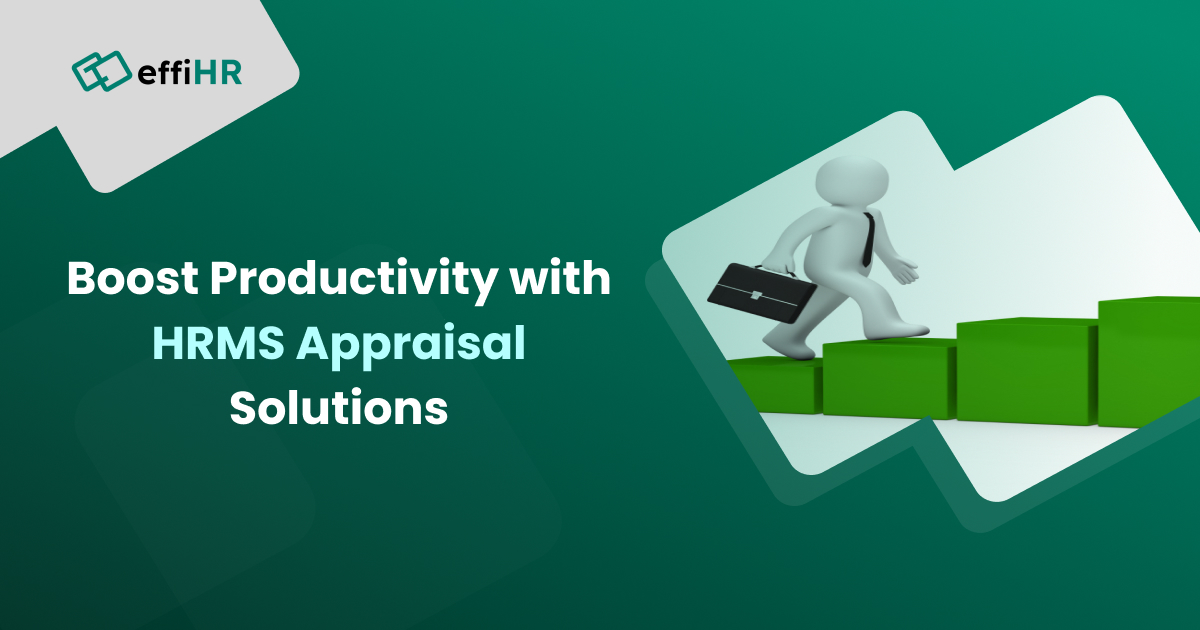Share Article
Get in touch
One of the most effective ways to enhance productivity is through well-structured performance appraisals. Traditional appraisal methods, however, often fail to provide timely, actionable insights. Enter HRMS Appraisal Tools—a game-changer for businesses looking to optimize workforce performance while fostering employee growth and satisfaction.
In this blog, we’ll explore how HRMS appraisal tools improve workplace productivity and transform the performance review process.
Challenges with Traditional Appraisal Processes
Performance appraisals are essential for evaluating employee contributions, but traditional methods are often plagued with issues such as:
- Bias and Subjectivity: Lack of standardized criteria can lead to inconsistent evaluations.
- Delayed Feedback: Annual reviews often fail to address ongoing performance improvements.
- Time-Consuming Processes: Manual tracking and reporting take up valuable HR resources.
- Lack of Goal Alignment: Employees may not fully understand how their goals align with organizational objectives.
These shortcomings can result in disengagement, reduced productivity, and a lack of actionable insights for both employees and managers.
How HRMS Appraisal Tools Enhance Productivity
HRMS appraisal tools overcome these challenges by automating and streamlining the performance review process. Here’s how they drive productivity:
1. Streamlined Performance Tracking
HRMS systems enable continuous performance tracking through integrated tools like key performance indicators (KPIs) and milestones. Employees and managers can monitor progress in real time, ensuring transparency and accountability.
2. Goal Setting and Alignment
HRMS platforms allow managers to set SMART (Specific, Measurable, Achievable, Relevant, Time-Bound) goals that align with organizational objectives. Clear expectations empower employees to focus on tasks that matter most.
3. 360-Degree Feedback
HRMS systems facilitate multi-source feedback, gathering insights from peers, subordinates, and managers. This holistic approach provides a balanced view of an employee’s performance, reducing bias and increasing fairness.
4. Automated Appraisal Workflows
The appraisal process, from self-assessments to manager reviews, is automated within an HRMS, saving time and ensuring consistency across departments.
5. Real-Time Insights and Reports
HRMS systems generate detailed performance reports, highlighting strengths, areas for improvement, and overall trends. These insights help managers make data-driven decisions to enhance team productivity.
6. Continuous Feedback and Recognition
Modern HRMS appraisal tools support regular feedback sessions and instant recognition for achievements, motivating employees to maintain high performance levels.
Benefits of Using HRMS Appraisal Tools
1. Enhanced Employee Engagement
Regular, constructive feedback and recognition foster a culture of trust and motivation, keeping employees engaged and focused on their roles.
2. Reduced Turnover
Employees who understand their performance expectations and feel appreciated are less likely to seek opportunities elsewhere.
3. Improved Manager-Employee Communication
With HRMS tools, managers can provide clearer guidance and establish a consistent feedback loop, strengthening workplace relationships.
4. Data-Driven Decision-Making
HRMS tools provide actionable data that managers can use to identify top performers, address skill gaps, and allocate resources effectively.
5. Increased Organizational Efficiency
Automated workflows reduce administrative burdens, enabling HR teams and managers to focus on strategic initiatives.
Best Practices for Leveraging HRMS Appraisal Tools
- Customize Appraisal Criteria: Tailor evaluation metrics to align with organizational goals and individual roles.
- Promote Continuous Feedback: Use HRMS tools to establish a feedback-rich environment that supports ongoing improvement.
- Train Managers and Employees: Ensure everyone understands how to use the appraisal tools effectively for maximum impact.
- Leverage Analytics: Use performance data to identify patterns and trends, driving targeted productivity initiatives.
Integrate with Other HR Functions: Connect appraisal tools with payroll, learning, and development modules to create a seamless HR ecosystem.
Conclusion
HRMS appraisal tools are revolutionizing how businesses manage and enhance employee performance. By automating processes, providing real-time insights, and fostering continuous feedback, these tools empower organizations to boost productivity while creating a motivated and engaged workforce.
If your organization is still relying on traditional performance appraisal methods, it’s time to upgrade to an HRMS solution that can drive productivity and growth.
Ready to explore the potential of HRMS appraisal tools for your business? Contact us today to learn more!





